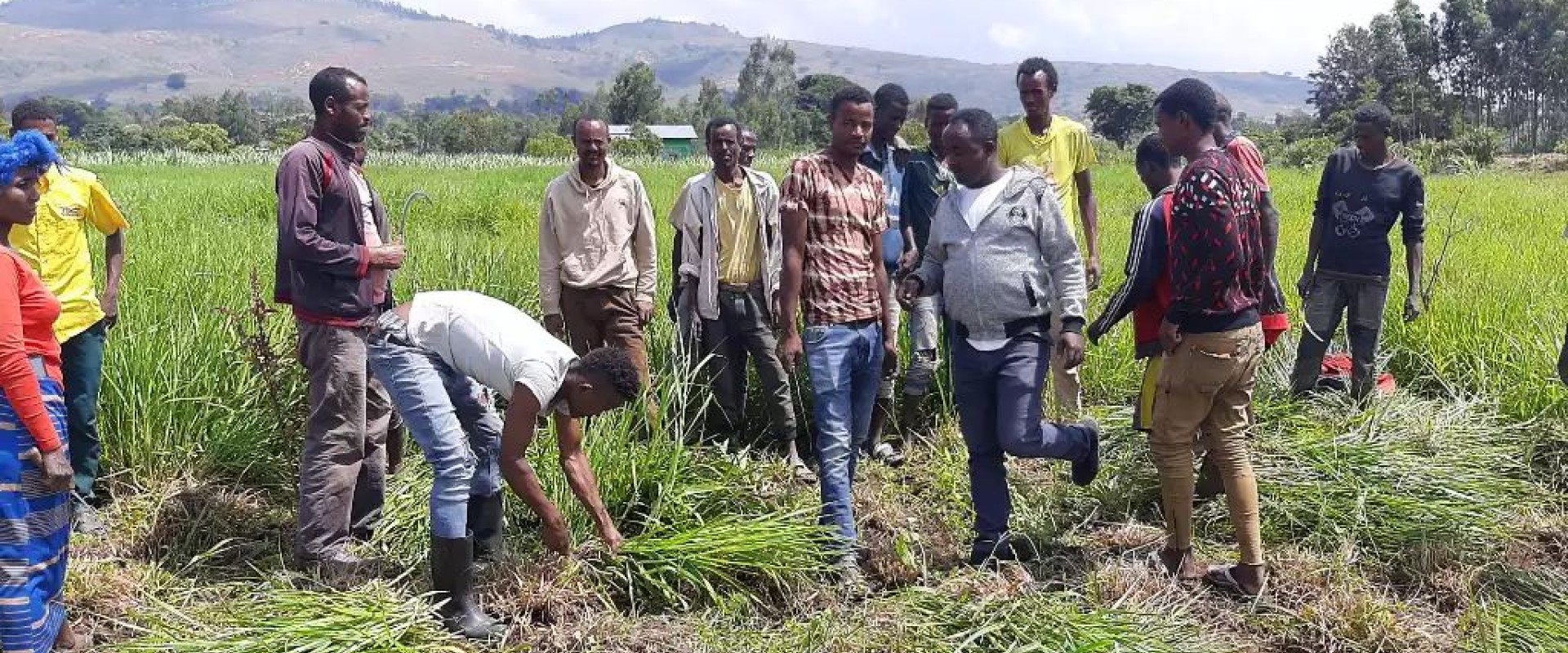More Support For Returnees In The Time Of COVID–19
In Ethiopia’s Shashego sub-district, 11 migrant returnees and 19 other vulnerable community members have sold their first harvest of fodder grass to the local market, earning USD580. Another USD5,800 worth of grass is ready for harvesting.
The group farms on 2.5ha provided by the government in the Southern Nations, Nationalities, and Peoples’ Regional State (SNPP). An additional 1.5ha has been promised and will be made available in the upcoming months.
The project has been made possible by the EU-IOM Joint Initiative for Migrant Protection and Reintegration in the Horn of Africa. The fodder farmers are a welcome success story, especially at this point when many other migrant returnees in Ethiopian are affected by the socio-economic impact of the restrictions put in place to reduce the spread of COVID-19.
Take Admasu who together with his wife Berhanesh and two children returned from Sudan in 2019. Their third child is now six months old. The small retail shop they own was established with support from the EU-IOM Joint Initiative which also facilitated their return.
“The school our eldest daughter goes to provides meal to students. She used to have her lunch and snack there. Now that school is closed (due to COVID-19), and with businesses slowing down, we are struggling to feed all our children,” says Berhanesh.
To mitigate human suffering during the pandemic, the EU-IOM Joint Initiative has extended emergency subsistence support, providing USD121,000 in cash assistance to 915 returnees. Those who have not yet received individual reintegration assistance from the International Organization for Migration (IOM) got USD130 as unconditional cash support to meet their basic needs.
“The pandemic has affected businesses; prices have gone up and some sectors have reduced labour to minimize the spread of the virus. Many youth are affected by these circumstances,” says Eyuale Tadesse, deputy administrator of Hadiya Zone and head of Enterprise and Industry Development Department in SNNP. The region accounts for the second largest number of returnees assisted under the EU-IOM Joint Initiative.
“The cash provided to the returnees has given them hope to strive in these circumstances. Some even bought goats and sheep with the cash assistance with plans to fatten them and sell them for a better value,” Tadesse explains.
Within the same month, around 235 vulnerable returnees voluntarily returned with assistance from EU-IOM Joint Initiative have been provided with material support worth of USD373,000 to start small businesses in their home communities. In addition, another 1700 vulnerable returnees awaiting reintegration assistance under the programme were consulted about their reintegration plans and will be provided with assistance in coming months.
According to Tadesse: “We often struggle to keep the youth from migrating without proper documentation. Smugglers often persuade them to take a faster option to make money. Now, with IOM’s support, they are getting practical assistance and they are greatly motivated to start over.”
There is no doubt that COVID-19 is exacerbating the vulnerability of Ethiopian migrants in transit and destination countries. Since April more than 21,000 nationals have returned from Djibouti, Somalia, Sudan, Saudi Arabia, Kenya, Kuwait, and Lebanon among other countries. The government’s resources are stretched between assisting returnees and facilitating their reintegration while at the same time working to control the spread of COVID–19.
In support of government efforts, personal protective equipment and other items worth over EUR 96,000 have been distributed at seven government quarantine centres in Addis Ababa under the EU-IOM Joint Initiative. The centres have hosted more than 5,800 returnees from the Gulf States and other countries since April 2020.
About the EU-IOM Joint Initiative
Launched in December 2016 with the support of the European Union (EU) Emergency Trust Fund for Africa, the programme brings together 26 African countries of the Sahel and Lake Chad region, the Horn of Africa, and North Africa, the EU and IOM around the goal of ensuring that migration is safer, more informed and better governed for both migrants and their communities.
